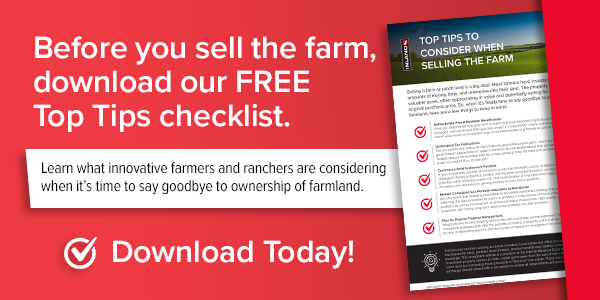In previous posts, we discussed ways you can help preserve your family farm’s legacy and shield yourself from excessive taxation when selling your farm or ranchland. In this discussion, we continue to explore the 1031 exchange, a strategy often preferred by many landowners seeking to maximize their profits on the sale of a farm.
As you may recall, Section 1031 of the Internal Revenue Code (IRC) allows investment property owners to defer capital gains tax on a property sale by reinvesting the proceeds in a “like-kind” property, or properties, of equal or greater value, resulting in what is known as a “1031 exchange”. The good news is that your farm is considered an investment property, so you satisfy the ownership requirement.
Questions often arise among farmers who are first considering a 1031 exchange. Many wonder what the definition of like-kind includes, and others may ask which specific farm assets are deemed property. This brief overview may help address those questions.
Like-Kind Property
The IRS provides broad latitude in the types of property it considers like-kind under a Section 1031. As long as the exchange involves “real estate used in a trade or business or held for investment,” like kind properties can include:
- farmland
- multifamily apartments
- self-storage facilities
- healthcare facilities
- student housing
- office buildings
- retail centers
- strip malls
- industrial warehouses
As you can see, with a 1031 exchange, you are not limited to replacing your farmland with other farmland. In fact, one of the most attractive attributes of a 1031 exchange is the ability for you to purchase a replacement property of a different type that can provide consistent passive income without active management responsibilities.
Qualifying Farm Assets
There are several categories to consider when it comes to identifying which farm assets are considered “investment property” under 1031 exchange guidelines.
Property
Your real estate property meets exchange requirements, and generally, most improvements attached to the land will as well. Those assets could include barns, grain bins, wells, and other structures. However, if you live in a residence on the property, it cannot be included in the exchange. But if you rent the home to a tenant or caretaker, it is considered property used in a trade or for business purposes and would qualify.
Equipment, Machinery, Livestock
Before the Tax Cuts and Jobs Act of 2017, personal property (in addition to real estate) was often allowed to be included in a 1031 exchange. But after passage of the Act, personal property was excluded. That change had an impact on farmers considering a farm sale. Farm equipment, machinery, and livestock no longer qualify for a 1031 exchange.
Crops
Harvested crops are not considered investment property under Section 1031. However, unharvested crops may be allowed when they are sold with the land at the same time of the exchange and to the same buyer. To trade unharvested crops for real estate, state law must deem the unharvested crops to be real estate.
Water Rights
The IRC generally recognizes water rights as like-kind property since they are considered an extension of the property’s surface rights. Ownership shares in a mutual ditch, irrigation company, or reservoir can also be exchanged at the time of sale upon meeting certain conditions.
Mineral Rights
Mineral rights that are considered real estate may also be included in a 1031 exchange, assuming interests are transferred at the property sale.
Next Steps
As you have read in earlier posts, selling your farm using a 1031 exchange may provide several meaningful benefits in helping you preserve and grow your wealth. But, as you see here, some limitations and rules apply that you need to be familiar with.
We recommend working closely with a real estate attorney and tax consultant when evaluating a 1031 exchange to ensure you have a sound knowledge of the different moving parts.
We will continue to discuss the 1031 exchange option in future posts, particularly the Delaware statutory trust (DST) structure that many farmers have chosen to use for their exchanges.
If you would like to learn more about how Inland Private Capital Corporation works with financial professionals to help farmers preserve family farm legacies, fill out the form on the contact us page, and a representative will call you within 24-48 hours.
This communication is not intended as tax advice.
This website is neither an offer to sell nor a solicitation of an offer to buy any security which can be made only by a prospectus, or offering memorandum, which has been filed or registered with appropriate state and federal regulatory agencies, and sold only by broker dealers and registered investment advisors authorized to do so.
The Inland name and logo are registered trademarks being used under license. "Inland" refers to some or all of the entities that are part of The Inland Real Estate Group of Companies, Inc. which is comprised of a group of independent legal entities some of which may be affiliates, share some common ownership or have been sponsored and managed by such entities or subsidiaries thereof including the Inland Real Estate Investment Corporation (Inland Investments) and Inland Securities Corporation. Inland Securities Corporation, member FINRA/SIPC, is dealer manager and placement agent for programs sponsored by Inland Investments and Inland Private Capital, respectively. For more information on Inland Securities Corporation, visit FINRA BrokerCheck.

